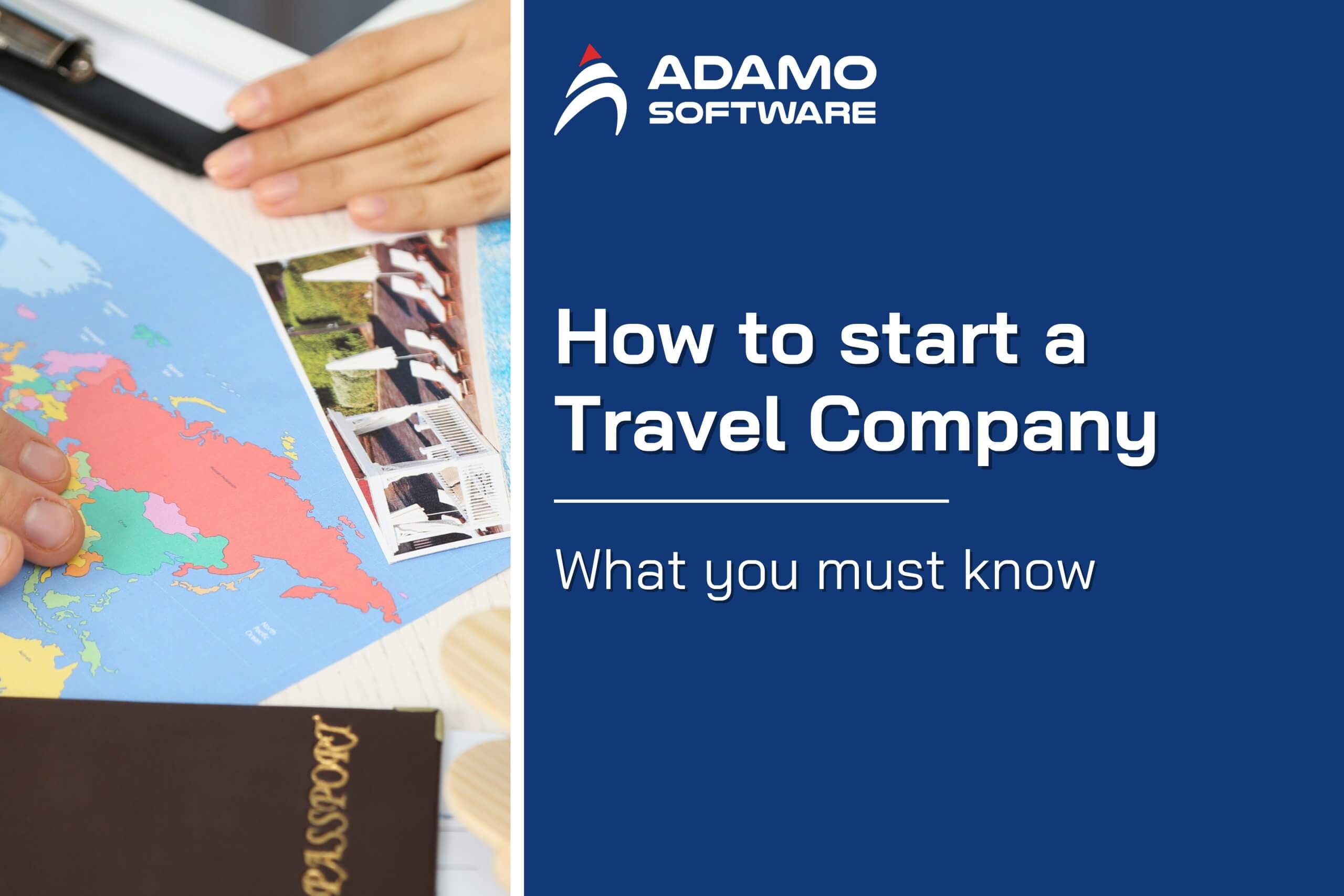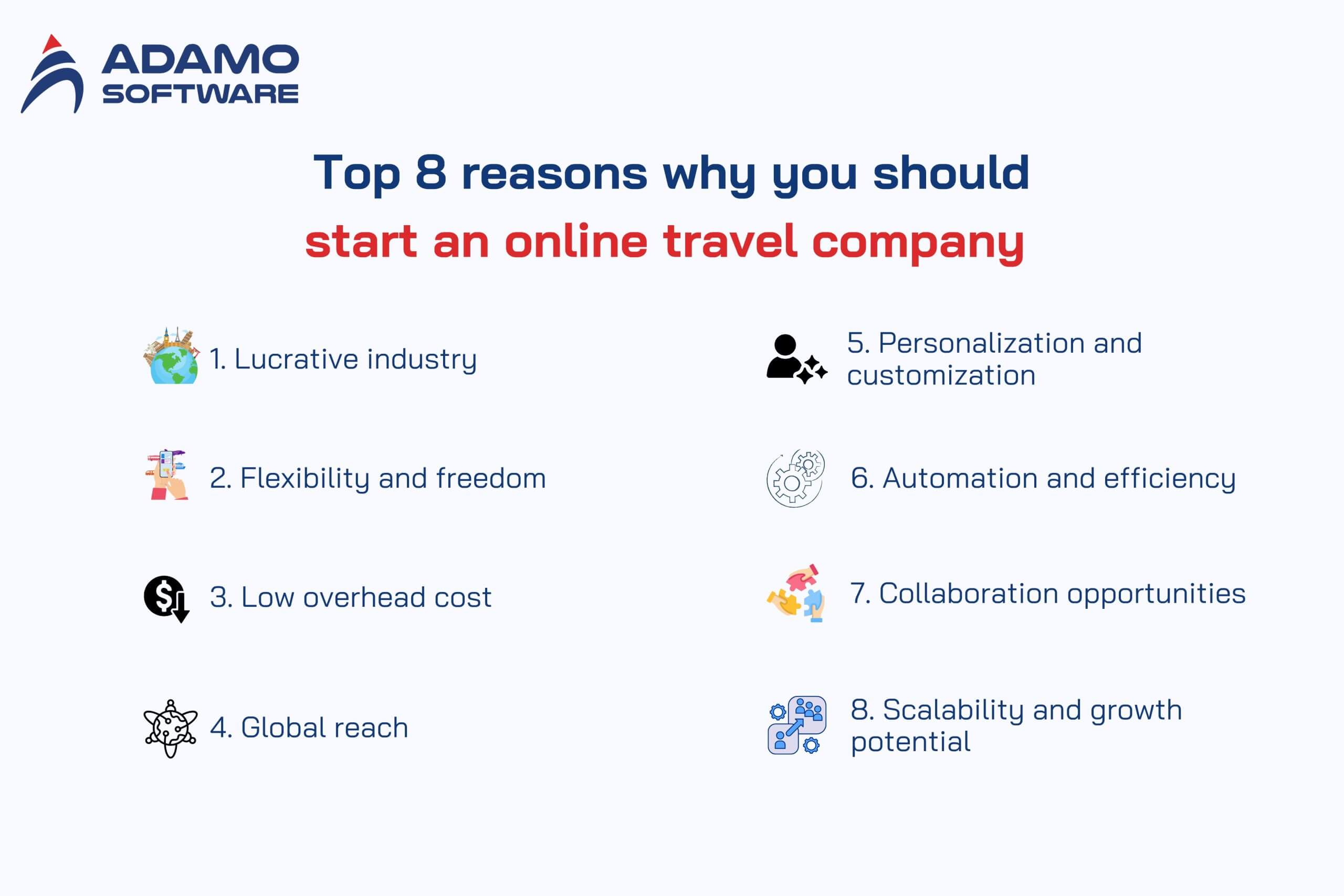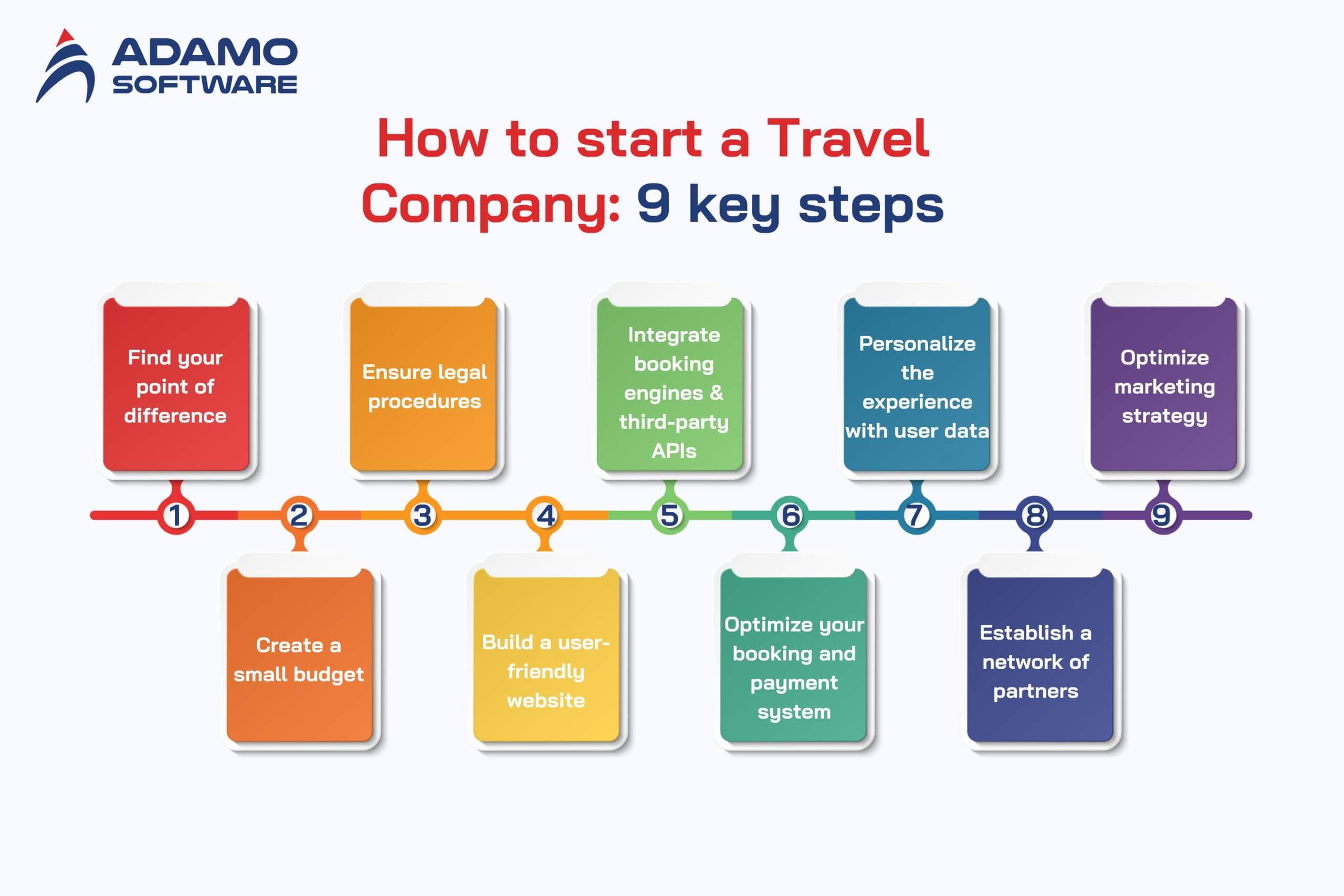How to Start a Travel Company in the digital age: What you must know

Learn how to start a travel company with low costs, smart tools, and real growth potential. A step-by-step guide for aspiring travel entrepreneurs.
Do you love traveling and want to turn that passion into a real business opportunity? Building a travel agency is a potential choice in the context of the global tourism industry, which is recovering strongly. No longer limited by traditional offices, you can now completely reach global customers through a digital platform – where all tour booking, itinerary searching, or planning are done in just a few clicks.
According to the World Travel & Tourism Council (WTTC) research, global revenue from tourism and travel has surpassed the 9.5 trillion USD mark in 2023 – and there are no signs of slowing down. The habit of booking tours online is becoming more and more popular, opening big doors for those who know how to exploit technology properly.
But how to start a travel company? And what preparations are needed to build a systematic business platform? This article will help you understand the costs and 9 key steps to start a travel agency.
I. Travel Company market: Is it worth investing in?
Starting a business is never easy — and if you’ve ever wondered how to start a travel company, you’ve probably asked yourself: Is this the right time?
The truth is that travel is changing. People are no longer just booking flights; they’re looking for meaning, connection, and peace of mind — and that shift has opened up real opportunities for those ready to serve.
1. Growing Interest in Travel Advisors
Gone are the days when people searched, clicked, and flew. More than ever, travelers want expert advice, someone to make sense of the chaos. According to TravelAge West and ASTA research, over 50% of travelers today are more inclined to use a travel advisor than before. It’s not about luxury — it’s about confidence.
2. Expanding Travel Agency Market
Travel agencies may be outdated, but the numbers say otherwise. According to research by Phocuswright, U.S. agencies hit over $42.7 billion in gross bookings in 2023 — and growth isn’t slowing down. What’s changed is the model: from generic packages to niche, curated experiences.
3. Business Travel Opportunities
For a while, business travel was on pause. But today, it’s not only returning — it’s transforming. According to research, domestic business trips are expected to rise by 7% by the end of 2024. There’s growing demand for travel companies that understand the pace and pressure of doing business on the move.
4. Global Industry Growth
Travel and tourism are now one of the most significant economic engines worldwide. The World Travel & Tourism Council (WTTC) estimates the sector will contribute $11.1 trillion to global GDP in 2024 — around 10% of the worldwide economy. That’s a massive space to grow in if you build with intention.
5. Rising Use of Online Travel Agencies
People love the ease of booking online — that’s not going away. According to research by Phocuswright, U.S. OTA bookings nearly doubled post-pandemic in 2021 and continue to rise. But even in a digital world, what sets travel companies apart is how well they connect with real human needs.
II. Top 8 reasons why you should start a travel company
With the tourism industry recovering strongly and users increasingly favoring personalized experiences, establishing a travel company opens up many business opportunities. If you are considering how to start a travel company, here are 8 reasons to start confidently.

1. Lucrative Industry
According to a report by the World Travel & Tourism Council, the tourism industry is expected to contribute about 11.1 trillion USD to global GDP in 2024 – accounting for about 10% of the total economic value of the world. This is a clear testament to this sector’s long-term and sustainable growth potential.
Starting a business in such a large and dynamic market allows you to reach a diverse customer base and grow your revenue significantly.
2. Flexibility and freedom
Without traditional premises, an online travel agency allows you to work from anywhere – whether in your home office, a coffee shop, or when traveling.
This flexibility helps you optimize operating costs and efficiently serve customers in different time zones.
3. Low overhead cost
Compared to opening a traditional travel agency, the online model helps you save significantly on fixed costs: rent, staff, equipment, electricity, water, etc.
Just by investing in a user-friendly tour booking platform and an efficient backend system, you can operate a travel company at an optimal cost while still ensuring professionalism. Therefore, if you are looking for a way to start a travel company on a reasonable budget – this is an option worth considering.
4. Global Reach
According to research from Google Travel, more than 70% of users start their travel journey with an online search.
If you invest in SEO and user experience correctly, your company can reach global customers right from the first days of operation.
5. Personalization and customization
Modern customers don’t just want to book a tour – they want to be understood. Applying data analysis and user behavior helps you provide personalized travel packages based on interests, age, itinerary, etc.
The closer the service is to the needs, the higher the satisfaction level and the possibility of customers returning.
You can explore about smart tourism hits the road of digital tourism here.
Ready to Outsource?
Get top-tier IT talent without the hassle. Contact us now!
6. Automation and efficiency
Technology is a great help for small businesses – especially in the tourism industry.
Automating booking confirmation, scheduling, sending notifications, etc., will help you save time, reduce errors, and focus on building customer experiences.
Even if you are a startup with a small team, you can still serve hundreds of customers professionally.
7. Collaboration opportunities
The tourism industry is an ideal place to cooperate with third parties such as airlines, hotels, local tour companies, travel bloggers, etc.
These relationships bring better deals and help your brand appear on more media channels, increasing recognition and reputation in the market. Most people who are researching starting a travel company consider this a key strategy to create a competitive advantage.
8. Scalability and growth potential
Once the operating model is in place, expansion is no longer a complex problem. You can develop additional services such as airline tickets, insurance, local tours, personalized travel packages, etc.
In particular, the digital platform also makes it easy to experiment with new tourism models such as healing tourism, leisure (work and play), or travel-for-remote-workers – segments that are growing well.
III. How to start a travel company: 9 key steps
Starting a travel company requires more than just passion; it also requires a clear strategy. Discover how to start a travel company: 9 key steps to help you get a solid start in this promising field.

1. Find your point of difference
The travel market is very competitive, so you first need a unique direction. Instead of catering to the masses, choose a niche – wellness tourism, luxury resorts, youth tours, or sustainable travel for small groups.
To determine the real demand, you can observe social media and travel forum trends or talk directly to travel bloggers. The goal is to find a potential segment that is not being appropriately exploited – that is your opportunity to create a competitive advantage.
2. Create a smart budget
To keep your company running smoothly, a master plan is essential. The list should include:
- Website development costs or use of an existing platform
- Travel tools: booking system, CRM, data analytics tools
- Free marketing: SEO, social media, content, advertising
- Business licensing, legal, and insurance
- Operating costs: human resources, office, any definition software
You don’t need to spend a lot at the beginning. Starting small and investing in the right places is a smart way to learn how to start a travel company sustainably.
3. Ensure legal procedures
Depending on the school, you must register for the appropriate business model (e.g., sole proprietorship, LLC, etc.). You may need to apply for a tourism license or professional liability insurance.
Doing the paperwork helps you work legally and creates trust with partners and customers.
4. Build a User-Friendly Website
The website is the face of business. It must be optimized for desktop and mobile, has a straightforward interface, fast loading speed, and simple tour booking operations.
Indispensable factors include:
- Easy trip search
- Clear information display: price, image, description
- Integrate secure payment (such as Stripe and PayPal)
- Online customer support (chatbot or live chat)
- Friendly, reliable interface
Prioritize choosing a travel software development unit to ensure that the website is not only beautiful but also operates smoothly – an important factor in the journey of how to start a travel company effectively.
5. Integrate booking engines and third-party APIs
To enable customers to book flights, hotels or cars directly on your website, you need to:
- Connect to a reliable booking engine
- Integrate APIs from providers like Amadeus, Sabre or Travelport
- Ensure a smooth experience when searching – comparing – booking
- Choosing the right tools and partners will help you save time, expand your products, and increase revenue quickly.
6. Optimize your booking and payment system
Ensure your booking and payment process is smooth, multilingual, multi-currency, and flexible with cancellation/conversion.
A modern booking system should allow customers to track their itinerary, receive automatic confirmation, and easily change information. A smooth experience will increase the rate of tour completion and keep customers coming back.
7. Personalize the experience with user data
Users expect more from travel platforms – they want to be recommended exactly what interests them.
By collecting data from user behavior, you can use AI to suggest itineraries, offers, or content relevant to each audience.
Personalization enhances the experience and helps increase conversions and build lasting relationships with customers.
8. Establish a network of partners
Collaborating with airlines, hotels, and local tour operators will help you build unique service packages and have a price advantage.
If you operate in a specific segment, find the right partners. For example, with wellness tours, connect with yoga centers or organic food brands.
Partners not only support you with resources but also help increase brand coverage.
9. Optimize marketing strategy
You don’t need to spend much money on marketing if you do it right. Focus on:
- SEO: create SEO-standard content to increase your presence on Google
- Content marketing: write blog posts, travel guides, case studies
- Social media: share images, real-life reviews, interact via reel/story
- Email marketing: send promotions and helpful content periodically
Also, don’t forget to automate customer feedback and booking tracking tasks to save time and operating costs.
IV. How much does it cost to invest in a travel company?
Starting a travel business doesn’t have to be expensive – especially if you choose an online model, work from home, and don’t need a traditional office.
Here’s a cost estimate to help you budget accordingly:
| Elements | Estimated Cost | Description |
| Business Registration and Licensing | $50 – $500USD | Including registering a business name, choosing the type of operation (individual, LLC…), and paying the cost of applying for a license as required in the area of operation. |
| Travel Agent Certifications and Training | $0 – $1,000USD
|
Some courses or certifications for travel agents will help increase prestige, such as TAP, CTA… You can choose to study online to save money. |
| Travel Booking Software and Tools | $50 – $300USD per month | Including systems such as GDS to book airline tickets, hotels, tours… Costs are usually in the form of monthly subscriptions. |
| Marketing and Branding | $100 – $600USD per year | Including logo design, website development, business card printing, and online content creation costs. You can take advantage of AI website builders to save time and money. |
| Office Space and Supplies (Optional) | $0 – $1,500+USD | If you work from home, you don’t need to invest too much. If you open an office, you need to spend more on renting space, buying basic equipment such as computers, phones, etc. |
| Insurance | $200 – $600USD per year | Includes packages such as professional liability insurance, E&O to protect businesses against unforeseen risks. |
| Industry Memberships | $100 – $500USD per year | Consider joining associations like ASTA or CLIA to expand your connections, stay updated on industry information, and increase credibility with clients. |
Estimated Total Costs
The total costs of starting a travel business can range from $400 to $5,000, depending on the business model and scale you choose. If you work from home, don’t need a separate office, and start with a minimal model, your costs can be on the lower end of this range.
V. Final thoughts
Starting a business in the online travel industry offers great opportunities but also requires careful preparation in technology, strategy, and user experience. From identifying a niche market and building a friendly tour booking platform to integrating APIs and personalizing itineraries. Every element needs to be designed to be lean, efficient, and scalable.

Instead of starting from scratch, working with a travel technology partner who understands the travel industry will help you save time, optimize your budget, and minimize risks. With experience implementing dozens of projects in the Travel Tech field, Adamo Software provides customized travel software solutions according to your business model. From OTA platforms and social travel apps to CRM systems and multi-channel booking APIs.
Ready to build your online travel platform? Contact us for advice on suitable solutions – from ideas to finished products.





